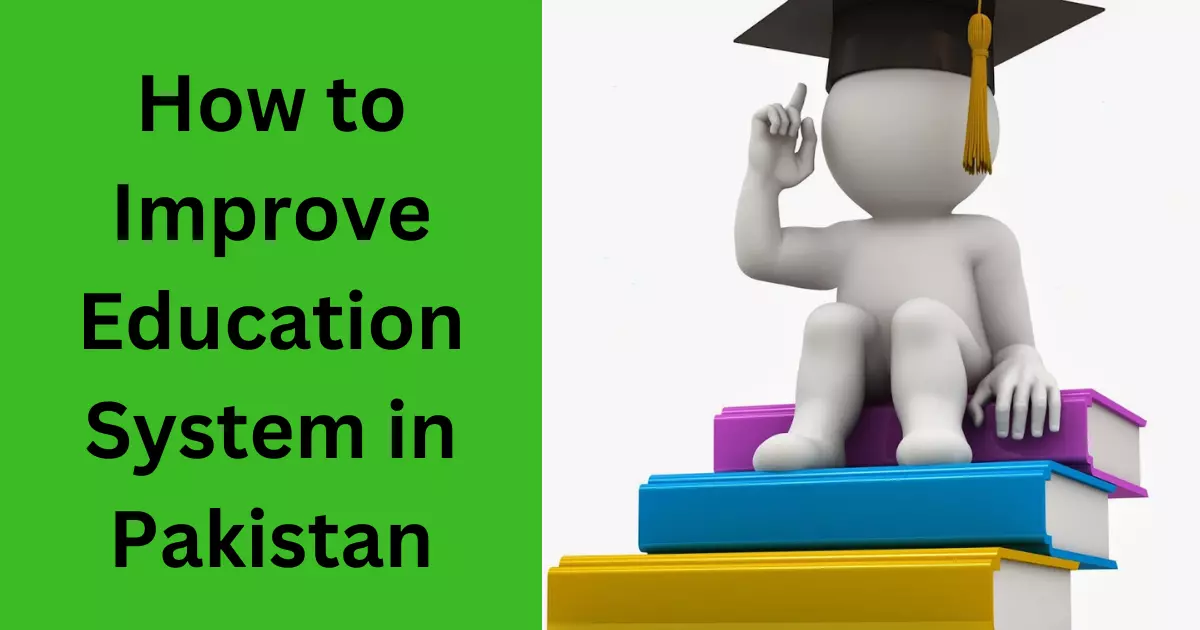In Pakistan, the education system stands at a pivotal crossroads, facing challenges that hinder its effectiveness and impact. Addressing these issues is crucial to sculpting a brighter future for generations to come.

This article delves into the key flaws, innovative solutions, and expert recommendations aimed at transforming Pakistan’s education landscape. By exploring practical strategies and success stories, this piece aims to ignite a discourse on revolutionizing education in Pakistan for the better.
Importance of Assessment and Teaching Methods
Assessment in Education:
Assessment lies at the heart of education, shaping learning outcomes and gauging progress. In Pakistan, rethinking assessment strategies is pivotal. Conventional exams frequently fall short of assessing a student’s abilities. By considering approaches, to evaluation, such, as project-based assessments, ongoing evaluations, and tests that focus on skills we can gain a comprehensive understanding of a student’s capabilities that goes beyond mere memorization.
Demonstration Method Explained:
The demonstration method stands as a powerful tool in the educator’s arsenal. It involves visual aids, practical demonstrations, and interactive sessions to enhance comprehension. Implementing this method in Pakistani classrooms can foster better student understanding and engagement. By allowing students to see concepts in action, this approach promotes deeper learning and application of knowledge.
Revamping Assessment Techniques:
Rethinking assessment practices involves a shift from merely testing memory recall to evaluating critical thinking, creativity, and practical skills. A balanced assessment system that combines traditional testing with innovative methods like portfolios, presentations, and project assessments can provide a more accurate measure of a student’s overall growth.
Improving teaching methods and assessment practices in Pakistan’s education system is pivotal. It requires a shift from conventional approaches to dynamic, student-centered methodologies that foster a deeper understanding of concepts and encourage the application of knowledge in real-world scenarios.
Addressing Systemic Flaws
Lack of Pedagogical Skills:
One of the fundamental challenges in Pakistan’s education system is the shortage of teachers equipped with modern pedagogical skills. Many educators lack training in interactive teaching methods, hindering effective knowledge dissemination. Initiatives focusing on continuous teacher training and development programs are crucial to enhance pedagogical skills and improve the overall quality of education.
Budgetary Constraints:
Limited financial resources pose a significant hurdle in revamping the education system. Inadequate budgetary allocations lead to insufficient infrastructure, outdated teaching materials, and a lack of resources for teacher training. Advocating for increased government spending on education and ensuring efficient utilization of allocated funds are imperative steps to overcome this challenge.
Career Counseling:
The absence of comprehensive career counseling in schools contributes to students’ uncertainty about prospects. Implementing robust career guidance programs can empower students to make informed choices about their educational paths and career trajectories. This guidance should encompass vocational training opportunities, higher education prospects, and skill development initiatives tailored to individual strengths.
Syllabus Quality and Equality:
Disparities in the quality and relevance of syllabi across regions perpetuate educational inequality. Ensuring a standardized, updated curriculum that incorporates diverse perspectives, modern knowledge, and relevant skills is crucial. Moreover, addressing disparities in educational resources among rural and urban areas is vital to promoting equal access to quality education.
Embracing New Technologies:
Incorporating technologies, into the education system is crucial to keep up with progress. Offering resources online learning platforms and interactive educational tools can enrich learning experiences. Narrow the gap, between students of diverse socioeconomic backgrounds.
Enhancing Teacher Training:
Investing in comprehensive and continuous teacher training programs is indispensable. These programs should focus not only on pedagogical techniques but also on fostering a student-centered approach, integrating technology into teaching practices, and promoting innovative and inclusive teaching methodologies.
Addressing these systemic flaws demands concerted efforts from policymakers, educational institutions, communities, and stakeholders. By acknowledging these challenges and implementing targeted reforms, Pakistan can pave the way toward a more equitable, inclusive, and effective education system.
Read more information: Education System in Pakistan: Issues, Problems and Solutions
Key Strategies for Reform
Identifying Flaws and Objectives:
The first step towards educational reform involves comprehensively assessing existing flaws and setting clear objectives. By identifying shortcomings in the current system and establishing specific goals for improvement, policymakers can chart a roadmap for effective reforms. This process should involve input from educators, experts, and stakeholders to ensure a holistic approach.
Promoting Project-Based Learning:
Introducing project-based learning methodologies can revolutionize the education landscape. This method gives importance to hands-on learning where students are encouraged to engage in real-life problems. By working on projects that demand thinking, teamwork, and finding solutions students acquire crucial skills, for thriving in today’s society.
Leveraging Modern Technology:
Technology catalyzes educational transformation. By incorporating resources, like applications, virtual reality simulations, and online learning platforms we can significantly improve student engagement and make education more accessible. These digital tools do not enhance the learning experience. Also equip students with the necessary skills, for a future that heavily relies on technology.
Rethinking Assessment Techniques:
Moving away from traditional examination-based assessments towards a multifaceted evaluation system is imperative. Implementing diverse assessment methods, including portfolios, presentations, and performance-based evaluations, enables a more comprehensive understanding of a student’s capabilities beyond memorization.
Upgrading Teaching Methods:
Empowering educators with innovative teaching methodologies is crucial for impactful learning experiences. Training programs should focus on fostering creativity, critical thinking, and adaptability among teachers. Encouraging interactive teaching practices and providing ongoing support can significantly enhance teaching effectiveness.
Implementing these strategies demands collaboration between educational institutions, government bodies, educators, and communities. By embracing progressive approaches and adapting to evolving educational paradigms, Pakistan can lay the groundwork for a transformative education system that nurtures well-rounded individuals equipped for success in a rapidly changing world.
Structural Improvements

Quality of Teaching Faculty:
The backbone of any education system is its teaching faculty. Enhancing the quality of teachers through rigorous training, professional development workshops, and incentives for advanced qualifications can significantly elevate the standard of education. Recruiting passionate and qualified educators and providing them with ongoing support is crucial.
Infrastructure Enhancement:
Infrastructure plays a pivotal role in providing a conducive learning environment. Upgrading school facilities, ensuring access to modern resources, such as libraries, laboratories, and technology centers, and maintaining safe and well-equipped classrooms are essential steps towards creating an optimal learning environment for students.
Public/Private Partnerships:
Working together with both the public and private sectors can greatly enhance the effectiveness of initiatives. By forming partnerships we can better allocate resources foster the exchange of knowledge and broaden opportunities in areas that lack adequate support. This collaboration can help bridge gaps in infrastructure, curriculum development, and teacher training.
Community Engagement:
Involving local communities in the education system fosters a sense of ownership and support. Engaging parents, community leaders, and local organizations in educational decision-making processes can lead to tailored solutions that address specific community needs and ensure a more inclusive and culturally relevant education.
School Accountability Systems:
Implementing robust accountability mechanisms is vital for ensuring educational quality and effectiveness. Establishing clear performance metrics, regular assessments, and transparent reporting mechanisms holds educational institutions accountable for delivering quality education. This encourages continuous improvement and ensures better outcomes for students.
Investing in these structural improvements requires a collective commitment from government bodies, educational institutions, community stakeholders, and private entities. By prioritizing these enhancements, Pakistan can create an educational ecosystem that fosters holistic growth and equitable access to quality education.
Overcoming Challenges in Implementation
Political Instability and Policy Consensus:
Political instability often disrupts long-term educational planning and implementation. Achieving consensus among policymakers from diverse ideological backgrounds is essential for sustained educational reforms. Creating bipartisan committees or advisory boards dedicated to education can ensure continuity and bipartisan support for initiatives.
Resistance to Change:
Traditionalist groups and resistance from within the education sector pose significant challenges to reforms. Educator training programs and awareness campaigns can help mitigate resistance by highlighting the benefits of innovative approaches. Engaging stakeholders in dialogue and involving them in decision-making fosters a sense of ownership and acceptance of change.
Corruption and Fund Mismanagement:
Corruption in educational institutions hampers progress and misdirects crucial resources. Implementing stringent oversight mechanisms, transparent budget allocations, and independent audits can combat corruption and ensure that allocated funds are utilized effectively for educational enhancement.
Cultural and Social Barriers:
Sociocultural norms and disparities often impede educational progress, particularly in marginalized communities. Addressing cultural barriers by promoting inclusivity, gender equality, and cultural sensitivity in curricula and policies can foster an environment where all students feel valued and respected, regardless of their background.
Overcoming these implementation challenges demands perseverance, collaboration, and a multi-faceted approach involving not only policymakers but also educators, communities, civil society, and international stakeholders. By addressing these obstacles systematically, Pakistan can pave the way for sustained and impactful educational reforms.
Powerful Recommendations from Experts:
1. Identifying Flaws & Setting Objectives to Achieve:
Experts advocate for a thorough assessment of the education system, pinpointing weaknesses, and setting clear, achievable objectives. This involves a systematic analysis to understand the root causes of issues and establish specific goals that align with international educational standards.
2. Promote Project-Based Learning:
Experts emphasize the transformative potential of project-based learning. Motivating students to participate in projects nurtures their ability to think critically solve problems effectively and develop a comprehension of various concepts. It stimulates their creativity. Promotes learning through application equipping them with the necessary skills to tackle real-world challenges.
3. Use Modern Technology:
Experts stress the integration of modern technology into education. This involves leveraging digital resources, online platforms, and interactive tools to enhance learning experiences, broaden access to quality education, and equip students with digital literacy skills essential for the future workforce.
4. Remodel Assessments:
Experts advocate for a shift in assessment paradigms. They suggest moving away from solely exam-based assessments to a multifaceted evaluation system that encompasses diverse methods, such as portfolios, presentations, and performance assessments, providing a more comprehensive view of students’ capabilities.
5. Upgrade Teaching Methods:
Experts stress the importance of continuous professional development for teachers. Encouraging innovative teaching methods, promoting student-centered approaches, and integrating technology into teaching practices are vital aspects that can enhance the quality of education imparted by teachers.
These valuable recommendations highlight the importance of taking an approach that tackles aspects of the education system. By putting these suggestions into practice Pakistan can begin a journey, towards an education system that’s more efficient, inclusive, and prepared for the future.
Bottom Line:
Transforming Pakistan’s education system requires a concerted effort, collaboration, and a commitment to change. Addressing systemic flaws, embracing innovative teaching methodologies, enhancing infrastructure, and overcoming implementation challenges are crucial steps toward this transformation.
By following the guidance of experts placing importance on student-focused methods incorporating technology, and ensuring opportunities, Pakistan can establish an education system that empowers its young population, encourages analytical thinking, and prepares them for the challenges of today’s world.
Through commitment and strategic changes, Pakistan can pave the way towards an education system of high quality that unleashes the potential of each learner and drives the nation towards advancement and success.
FAQs: Improve the Education System in Pakistan
By investing in teacher training, updating curricula, and ensuring modern, well-equipped learning environments.
Implementing initiatives that promote girls’ education, building more girls’ schools, and changing societal attitudes towards female education.
By providing access to digital tools, ensuring internet connectivity, and training teachers and students in technology-enabled learning.
Introducing need-based scholarships, increasing funding for schools in low-income areas, and providing free or subsidized textbooks.
Through a comprehensive review and update of curricula, incorporating modern teaching methods, and involving industry experts in curriculum development.
It is prioritizing education budget allocations, improving infrastructure in underserved areas, and implementing policies that bridge the educational gap between urban and rural regions.
